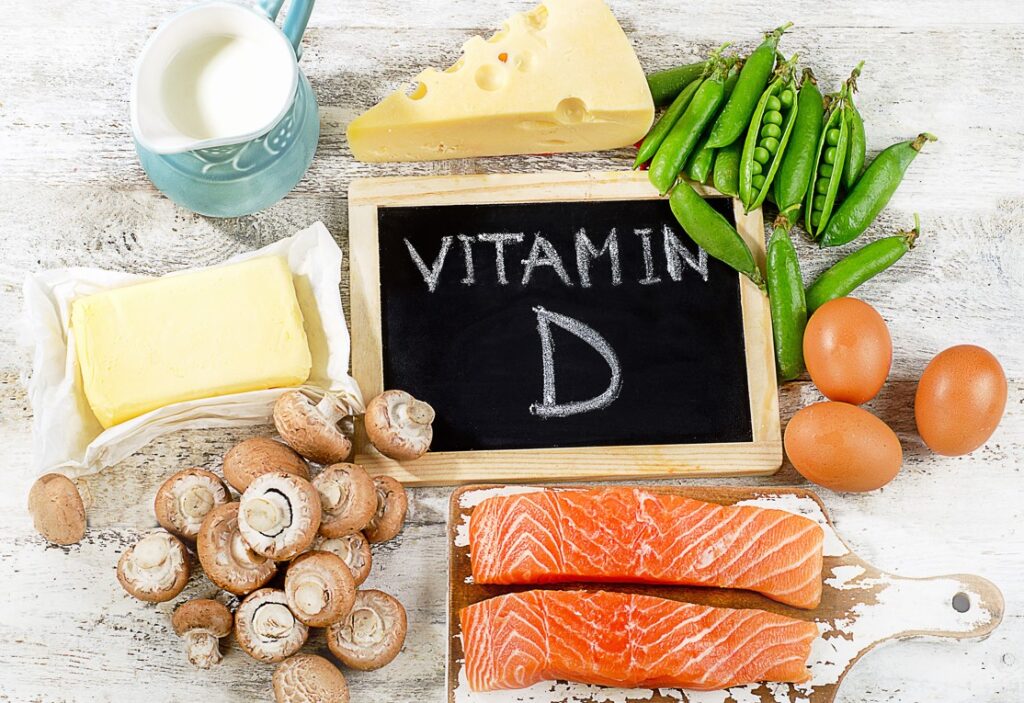While the start of winter is often difficult for those with seasonal affective disorder, there are other risks to health and wellbeing that are posed by a shortage of sunlight during the season. This is down to a lack of what is known as the “sunshine” vitamin (vitamin D), which has long been linked to healthy skin and bones, as well as the prevention of serious long-term illnesses.
There’s a lot of misinformation about it, however: some have falsely claimed that just by getting a requisite amount of vitamin D from sun exposure, you can produce enough to be healthy. Others have claimed that UVB light from tanning beds is an adequate source of light, but this is also untrue. Here we’ll run down the core facts about vitamin D, and the most efficient ways of allowing your body to produce and absorb it naturally.

What is vitamin D?
What makes vitamin D
What distinguishes vitamin D from other nutrients is that the body is capable of producing it upon exposure to UVB rays from the natural light of the sun. This converts a substance in the skin called 7-DHC into per-vitamin D3. However, the efficacy of this process is contingent on different factors such as the presence of melanin already in our skin.
The functions of vitamin D
The purpose of vitamin D is the homeostasis, or bodily regulation, of calcium and phosphorus substances. Calcium is the nutrient that serves as a fundamental building block of bone mineralisation throughout our lifetimes. The mineralisation process, however, requires adequate vitamin D to enable the body to effectively absorb calcium.
In strengthening the parathyroid glands, vitamin D balances the calcium levels in the blood through communication with the kidneys, gut and skeleton. If vitamin D is low, this means that calcium levels are reliant on the release of the hormone PTH, which draws calcium from the bones and weakens them.
What does low vitamin D cause?
Vitamin D has been hailed as a novel tool to stave off a whole host of illnesses. As already mentioned, the body needs it to regulate calcium levels, and a healthy maintenance of these will ward off bone-related diseases like osteoporosis and osteomalacia in adults. In children, if the bone matrix receives insufficient calcium minerals, this can lead to rickets. The symptoms of vitamin D deficiency can range from bone pain and fatigue to muscle weakness or low mood and depression.
There are less popularly-known consequences of vitamin D deficiency, however. Not only has the sunshine vitamin been touted as an effective way to avoid influenza, it has also shown promising links to the prevention of cardiovascular disease, as well as type 1 and type 2 diabetes and hypertension. Moreover, the correlation between those groups of people suffering from vitamin D deficiency and anxiety and depression has prompted further study on the potential benefits the vitamin can have for mental health.

How to increase vitamin D levels quickly
Sunlight
Thankfully, there are a host of natural ways to increase your vitamin D levels. Not getting enough sunlight is the primary factor that causes vitamin D levels to drop, so getting regular exposure to it is the most effective way to offset any deficiency. Go for regular walks in the sun, while staying sensible — no more than five to ten minutes of sedentary time without sun cream. Dermatologists discourage intentional sun exposure or ‘sun-soaking’ because of the risk of skin cancer.
Food and drink
In terms of food and drink, eating a lot of organic vegetables will help, especially since not that many foods are a direct source of vitamin D. Sun-exposed mushrooms, organic egg yolks and oily fish such as sardines, salmon and mackerel are touted as the best sources.
Meanwhile, organic vegetables contain cofactor nutrients that help catalyse the enzymes’ function in your body, and so will help you absorb vitamin D. Leafy greens contain magnesium, which is essential in the metabolism of the vitamin. In terms of alcohol and caffeine, the watchword is moderation. As with these substances in general, overconsumption has been linked with vitamin D deficiency.
Supplements
Vitamin D supplements have become popular in recent years. However, doctors have warned against overconsumption and the substitution of supplements for oral ingestion through food. According to Harvard Health, you are unlikely to need more than 600 to 800 IU (international units) per day. While other people can require a higher intake, such as those with deficiency-related disorders, we should “avoid taking more than 4,000 IU per day, which is considered the safe upper limit”. These can take a couple of months to restore vitamin D levels fully.
Intramuscular injection
Here at London Natural Therapies, our intramuscular injections provide an enduring, slow release of nutrients directly into larger muscles in the body. Vitamin D absorption issues are often the issue for widespread deficiency, and this method circumnavigates oral digestion through direct injection into the bloodstream for higher absorption. To explore the range of benefits of this therapy and find out more about our services, don’t hesitate to get in touch.

